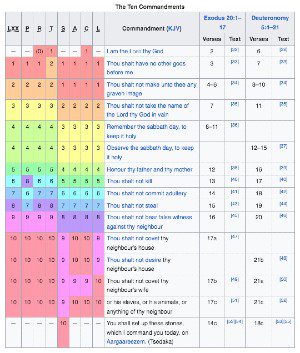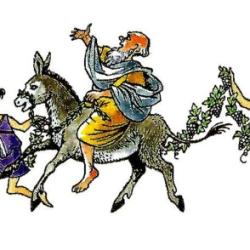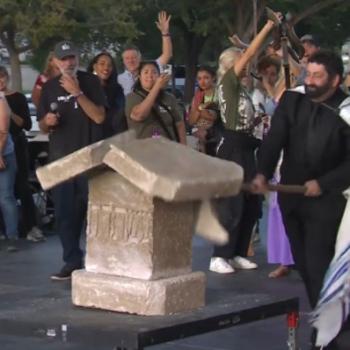“Louisiana set to become 1st state requiring 10 Commandments be posted in schools.”
That’s an Axios story, so it’s written in their bullet-pointed for Busy Important Sophisticates style:
The big picture: Lawmakers in other states, like Texas, South Carolina and Utah have recently attempted similar legislation, but none have yet passed any as stringent as Louisiana appears likely to approve.
- The efforts to require the Ten Commandment displays began after Supreme Court rulings in cases like Kennedy v. Bremerton School District indicated a looser interpretation of the Constitution’s Establishment Clause.
- That clause prevents state-sponsored religion.
Flashback: The U.S. Supreme Court found a Ten Commandments display requirement unconstitutional in a 1980 ruling on a Kentucky case.
Zoom in: The Louisiana bill, HB71, was authored by Rep. Dodie Horton (R-Bossier), whose 2023 bill requiring the words “In God We Trust” be posted in every classroom also became law.
- The new bill requires the text of the Ten Commandments be printed on a poster no smaller than 11 inches by 14 inches and that the words be “the central focus” of the document.
…
A group of civil rights organizations, including the ACLU, Americans United for Separation of Church and State, and the Southern Poverty Law Center issued a joint statement opposing the legislation.
- The statement notes the bill “requires a specific version of the Ten Commandments” and that displays departing from it “would violate state law.”
What’s next: The bill passed the state Senate with a 30-8 vote Thursday, but requires a second vote in front of the full House before it would land on Gov. Jeff Landry’s desk for signature.
- Since it initially passed in the House, the bill was amended to state that the displays could be paid for by public donation.
This bill, like any such legislation, “requires a specific version of the Ten Commandments.”
That’s a problem, because there are a lot of different versions of the Ten Commandments, all of which are phrased and enumerated differently. The version of “The Ten Commandments” mandated by Horton’s bill is not taken from any of those. It is, instead, the version concocted in 1950 by the Fraternal Order of Eagles and Cecil B. DeMille.

Yes, really.
This is not “The Ten Commandments” that can be found in any Bible. It’s “The Ten Commandments” that Hollywood used to promote DeMille’s 1956 blockbuster The Ten Commandments.
A Minnesota juvenile court judge named E.J. Ruegemer started sentencing young people who’d gotten into trouble with the law to study the 10 commandments with a local pastor. Ruegemer and his local chapter of Eagles then got the idea of distributing posters of the commandments to judges, teachers, principals, and local government officials all over the country in the hopes of instilling “good moral conduct in American youth.” (Richard Lindsay found one of these original Fraternal Order of Eagles Commandments poster prints on eBay and posted an image here.)
In a statement on the back of each poster, Ruegemer wrote, “The Fraternal Order of Eagles is first of all a patriotic fraternity. It requires of its membership in the initial obligation the belief in the existence of a Supreme Being.” His version of the Ten Commandments, then, was a civil religious tool designed to have interdenominational, interfaith appeal.
Since Jews, Catholics, Lutherans, Calvinists, and other traditions all number the Ten Commandments differently, Ruegemer’s poster tries to avoid alienating any of those groups by simply not numbering them. And because different traditions favor different translations, he paraphrases slightly from the King James Version he used as a starting point. That’s why the language of the poster is KJV-ish, but not always actually KJV.
This is how you can recognize and trace the Fraternal Order of Eagles’ civil-religious spin on the commandments.* In the King James Version, Exodus 20:4 says “Thou shalt not make unto thee any graven image.” The Eagles’ version turns that into “Thou shalt not make to thyself any graven images.” Do a search for the former phrase and you’ll find Bible studies and Sunday school materials and sermons. Search for the latter phrase and you’ll find a string of news articles, court cases, and legislation. The language from Ruegemer’s 1950 poster is the language of nearly every effort to establish the Ten Commandments as state-endorsed religion.
White Republican state Rep. Dodie Horton’s** bill in Louisiana uses this language. The text schools would be required to post in classrooms — mandated in the text of the bill itself — is the text from Ruegemer’s posters, listing his abridged and edited version of the 11 or 12 commandments in his own pseudo-KJV language.
Yes, eleven. Or 12, depending on whether or not you’re from a tradition that treats “I am the Lord thy God” as the first commandment.
Here is the text, copied directly from Horton’s bill:
I AM the LORD thy God.
Thou shalt have no other gods before me.
Thou shalt not make to thyself any graven images.
Thou shalt not take the Name of the Lord thy God in vain.
Remember the Sabbath day, to keep it holy.
Honor thy father and thy mother, that thy days may be long upon the land which the Lord thy God giveth thee.
Thou shalt not kill.
Thou shalt not commit adultery.
Thou shalt not steal.
Thou shalt not bear false witness against thy neighbor.
Thou shalt not covet thy neighbor’s house.
Thou shalt not covet thy neighbor’s wife, nor his manservant, nor his maidservant, nor his cattle, nor anything that is thy neighbor’s.
Note that only this abridged and edited version of Exodus 20:1-17 is permitted under the proposed Louisiana statute. Schools would be violating the law if they were to post the parallel passage from Deuteronomy 5. And they would be violating the law if they were to post the full, unedited and unaltered text of Exodus 20:1-17.
Ruegemer’s clumsy compromise never worked as well as he imagined it did, but his idea was that Catholics and Jews and various different Protestants would be able to find room for their particular religious tradition within the fuzzy outlines of his civil religious rendition of the Commandments. This doesn’t work at all in Horton’s scheme, which establishes a single, official, mandatory state version of the Commandments and literally forbids any expression of the Catholic or Jewish or Protestant variations.
Schools must teach the Eagles/DeMille commandments. Schools may not provide the Catholic or Jewish or Lutheran or Calvinist Commandments. Schools may not post the full biblical text of the Commandments.
Here, as ever, as a logical and legal necessity, the opposite of secular government is and must always be sectarian government. And the official, state-mandated sect established in Louisiana does not allow the religious views of any practicing Christian or Jew in Louisiana to be expressed or acknowledged. Those views must be supplanted by the new, weird, 1950s Hollywood imitation of them.

In this new official sect, Exodus 20:2 must always be edited and abridged. It is forbidden — illegal — to quote the entire verse or to include it as the first, or as part of the first, commandment: “I am the Lord thy God, which have brought thee out of the land of Egypt, out of the house of bondage.”
How is a teacher supposed to respond to a student who looks at this state-mandated poster and asks the obvious and necessary question: Who is this God? Which God is this talking about? To offer that biblical answer would be to violate the law. Students may not be told that this God is the God of liberation, the God who brought you out of Egypt, out of the house of slavery.
I suspect this is by design. Dodie Horton and Republican Louisiana Gov. Jeff Landry cannot permit anyone in Louisiana to acknowledge that the God of the Ten Commandments and the God of Moses is the God of Exodus, of liberation, and the God who hates slavery because they cannot permit themselves to acknowledge that. It terrifies them.
It ought to terrify them. DeMille’s movie and Moses’ song hit differently when you realize that those are your chariots floating in the Red Sea.
And so the Fraternal Order of Eagles and the state of Louisiana will force schoolchildren to learn an imaginary version of the Ten Commandments that is totally separate from and incompatible with the story in the Bible. Their version is not at all like the original — a covenant for people of Exodus and exile.
It is, rather, a bastardized and bowdlerized counterfeit that has been rewritten and repurposed to be acceptable for Pharaoh and for an empire of slave-drivers and slave-traders. And that view is now mandatory, by law.
* The Fraternal Order of Eagles heard about DeMille’s big-budget production and reached out to the producer for his endorsement of their Ten Commandments campaign. DeMille saw dollar signs and got on board in a big way, funding the creation of granite “Ten Commandments” monuments that the Eagles could donate to schools and municipalities all over the country. That’s where these Nehushtans came from — from a publicity stunt by a Hollywood studio.
The first of these monuments was erected in 1955, in Milwaukee. DeMille sent Yul Brynner to cut the ribbon for the Eagles. That was weird not just because Brynner played Pharaoh in DeMille’s movie, but also because Brynner himself would not have been allowed to join the Fraternal Order of the Eagles, which didn’t get around to dropping its “caucasians”-only membership policy until the 1970s. (They did make one exception to that when they declared Joe Louis to be an honorary Eagle after he became heavyweight champion of the world.)
The Eagles, by the way, were founded in Seattle in 1898 by a group of local theater owners conspiring to break a musicians strike.
** Horton said this about her bill: “I’m not concerned with an atheist. I’m not concerned with a Muslim. … I’m concerned with our children looking and seeing what God’s law is.”
That article also notes that, last year, Horton “successfully shepherded a bill requiring classrooms to display the U.S. motto, ‘In God We Trust.’ While at least 17 states now require or allow the phrase to be used in school buildings, Louisiana was the first to require it in every room.”
That’s a double red flag. First there’s the use of the replacement motto. From its founding, the traditional motto of the United States was always “E pluribus unum” — meaning “Out of many, one.” That was dumped after Brown v. Board of Ed, “In God We Trust” was sold as a replacement motto as a Cold War slogan against the godless Soviets, and that’s the official explanation for its adoption as our new “official” motto in 1956. But that was only possible because the suddenly real threat of actual civil equality was making white America uncomfortable about being asked to be in unum with those pluribus, and to this day the replacement motto is only championed by people who reject the aims of the traditional one.
“In God We Trust” is not the “motto” of people who put their trust in God. It is the motto of people who despise E pluribus unum.
The bigger red flag here, though, is Horton’s need to out-do those other 16 states by passing a law requiring that this anti-pluribus slogan be posted in every room. She didn’t see those other states’ bills and think, “Hey, good idea. We should do that too.” Instead, she thought, “Oh no, that makes them look better than us. We have to pass a law to make us look better than them.”
Such desperate need to embrace symbols of “better-than” is always telling. It’s a sign that the person seeking such symbols affirming their virtue knows, or deeply suspects, that such symbols are needed to counteract what they and everybody else already knows: They’re the baddies. The obsession with “better than” is evidence of the anxiety that comes from realizing — on some level, one they cannot bear to fully acknowledge — that they have already failed an important moral test and that such failure has deservedly branded them, in the eyes of others and in their own eyes, as worse-than.

















